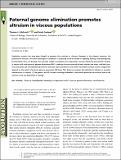Files in this item
Paternal genome elimination promotes altruism in viscous populations
Item metadata
| dc.contributor.author | Hitchcock, Thomas | |
| dc.contributor.author | Gardner, Andy | |
| dc.date.accessioned | 2022-08-08T09:30:02Z | |
| dc.date.available | 2022-08-08T09:30:02Z | |
| dc.date.issued | 2022-09 | |
| dc.identifier | 280436420 | |
| dc.identifier | 0bdc367e-c9a0-4238-a3e3-0d3c9bc1bb8d | |
| dc.identifier | 85135456007 | |
| dc.identifier | 000836858100001 | |
| dc.identifier.citation | Hitchcock , T & Gardner , A 2022 , ' Paternal genome elimination promotes altruism in viscous populations ' , Evolution , vol. 76 , no. 9 , pp. 2191-2198 . https://doi.org/10.1111/evo.14585 | en |
| dc.identifier.issn | 0014-3820 | |
| dc.identifier.uri | https://hdl.handle.net/10023/25789 | |
| dc.description | T.J.H. is supported by a PhD scholarship funded by the School of Biology, University of St Andrews. A.G. is supported by a Natural Environment Research Council Independent Research Fellowship (grant no. NE/K009524/1) and a European Research Council Consolidator (grant no. 771387). | en |
| dc.description.abstract | Population viscosity has long been thought to promote the evolution of altruism. However, in the simplest scenarios, the potential for altruism is invariant with respect to dispersal—a surprising result that holds for haploidy, diploidy, and haplodiploidy (arrhenotoky). Here, we develop a kin-selection model to investigate how population viscosity affects the potential for altruism in species with male paternal genome elimination (PGE), exploring altruism enacted by both females and males, and both juveniles and adults. We find that (1) PGE promotes altruistic behaviors relative to the other inheritance systems, and to a degree that depends on the extent of paternal genome expression. (2) Under PGE, dispersal increases the potential for altruism in juveniles and decreases it in adults. (3) The genetics of PGE can lead to striking differences in sex-specific potentials for altruism, even in the absence of any sex differences in ecology. | |
| dc.format.extent | 8 | |
| dc.format.extent | 581733 | |
| dc.language.iso | eng | |
| dc.relation.ispartof | Evolution | en |
| dc.subject | Paternal genome elimination | en |
| dc.subject | Haplodiploidy | en |
| dc.subject | Dispersal | en |
| dc.subject | Inbreeding | en |
| dc.subject | Social behaviour | en |
| dc.subject | Intragenomic conflict | en |
| dc.subject | QH301 Biology | en |
| dc.subject | T-DAS | en |
| dc.subject.lcc | QH301 | en |
| dc.title | Paternal genome elimination promotes altruism in viscous populations | en |
| dc.type | Journal article | en |
| dc.contributor.sponsor | NERC | en |
| dc.contributor.sponsor | European Research Council | en |
| dc.contributor.institution | University of St Andrews. School of Biology | en |
| dc.contributor.institution | University of St Andrews. Centre for Biological Diversity | en |
| dc.contributor.institution | University of St Andrews. Institute of Behavioural and Neural Sciences | en |
| dc.contributor.institution | University of St Andrews. St Andrews Bioinformatics Unit | en |
| dc.identifier.doi | 10.1111/evo.14585 | |
| dc.description.status | Peer reviewed | en |
| dc.identifier.grantnumber | NE/K009524/1 | en |
| dc.identifier.grantnumber | 771387 | en |
This item appears in the following Collection(s)
Items in the St Andrews Research Repository are protected by copyright, with all rights reserved, unless otherwise indicated.

